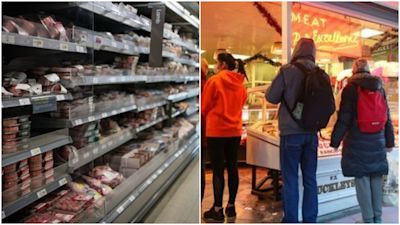Exclusive
Food Standards Agency warns vet shortage may impact meat production for Christmas

Vet shortage could impact Christmas, ITV News Business and Economics Editor Joel Hills reports
The Food Standards Agency has warned meat and poultry producers that a shortage of vets could impact their ability to operate in the run-up to the busy festive season.The Chief Operating Officer of the FSA, Dr Colin Sullivan, has written to companies that produce turkey, pork, beef, chicken, lamb, goose and duck to inform them that “there could be a small number of short service interruptions within the weeks prior to Christmas”.It is a legal requirement to have a vet on-site at an abattoir when animals are slaughtered to ensure that the meat which enters the food chain is fit for consumption.ITV News has seen the letter, which is marked “Official Sensitive”.Colin Sullivan describes the situation as “highly unusual” and blames the shortage of vets on “EU Exit, increased demand and COVID-19.”
His letter explains that Brexit has increased the demand for vets (the new trade rules require them to sign export health certificates) and made the recruitment of vets from the EU “much more challenging”.According to Sullivan, “pig backlogs” on farms have increased pressure on abattoirs and increased the risk that there won’t be enough vets to cope with the traditional increase in demand for meat at Christmas.The FSA says it is “redeploying appropriately qualified back-office veterinarians and Meat Hygiene Inspectors from other FSA teams to assist in abattoirs” but describes this as a “short-term contingency” and adds that “available back-office resource” is “almost at capacity”.The letter acknowledges that Christmas is “an extremely busy and important period for many sections of the meat industry” and urges companies to “work collaboratively” and share information to help “minimise any service disruption”.Companies across the food industry have been warning the government about a chronic shortage of vets for months.
In July, the chief executive of Eville & Jones, which supplies veterinary services to abattoirs, said his firm was short of 30 vets, out of a total workforce of 300.Charles Hartwell told the i newspaper that his attempts to recruit from abroad were being hampered by new, higher English language requirements set by the Royal College of Veterinary Surgeons.“Most European vets, although they meet all the technical standards and before January 2021 could have come and worked here without any problem, they don’t have that level of English,” he said.The Food Standards Agency says it is working to address the “application of higher English language standards”.
The FSA says there is currently a shortfall of between 40 and 50 vets, among its “veterinary service partners” and that it expects pressures to ease in the New Year.
In a statement, the FSA’s Chief Operating Officer, Colin Sullivan said: “Our meat inspection regime has been very resilient in responding to unprecedented challenges and there is no reason the current pressures will affect meat supply this Christmas.
"This is the busiest time of the year for the meat industry, and we’ve written to abattoirs to ensure we work together with the aim of preventing even the smallest disruption to our operations and their production.”
In September, the government launched a temporary visa scheme for poultry workers and later expanded it to include butchers but it did not make a provision for vets.
Vets have been on the Shortage Occupation List since 2019, which is designed to make it easier to bring in skilled labour from abroad.
To act as a vet in the UK, immigrants need to be a member of Royal College of Veterinary Surgeons and to have passed an English language ILETS exam to Level 7.
James Russell, Senior Vice President of the British Veterinary Association said: “Vets have an integral role to play within trade and across all stages of the food chain to ensure high levels of food safety, animal welfare, public health and consumer confidence in the products that we buy and export.
“BVA has long been voicing concerns about capacity issues in the veterinary workforce which have been exacerbated further by Brexit and the impact of Covid. Vets involved in these processes have been working flat out, but they are incredibly stretched because of multiple issues outside of their control.
“The profession is working really closely with industry and stakeholders to voice our concerns to governments and play our role in identifying and mitigating against any supply issues in the short and longer term.”
A response from a Government spokesperson said: “The UK has a highly resilient food supply chain, which vets play a key role in maintaining whilst upholding our world leading food and animal welfare standards.
“We continue to work closely with the meat processing and veterinary industries to ease any pressures on the market.
“We have already added vets to the Home Office’s Shortage Occupation list – whilst tripling the number of Official Veterinarians qualified to sign EHCs for animal products and funding surge capacity veterinarians as short-term support if it is required.”